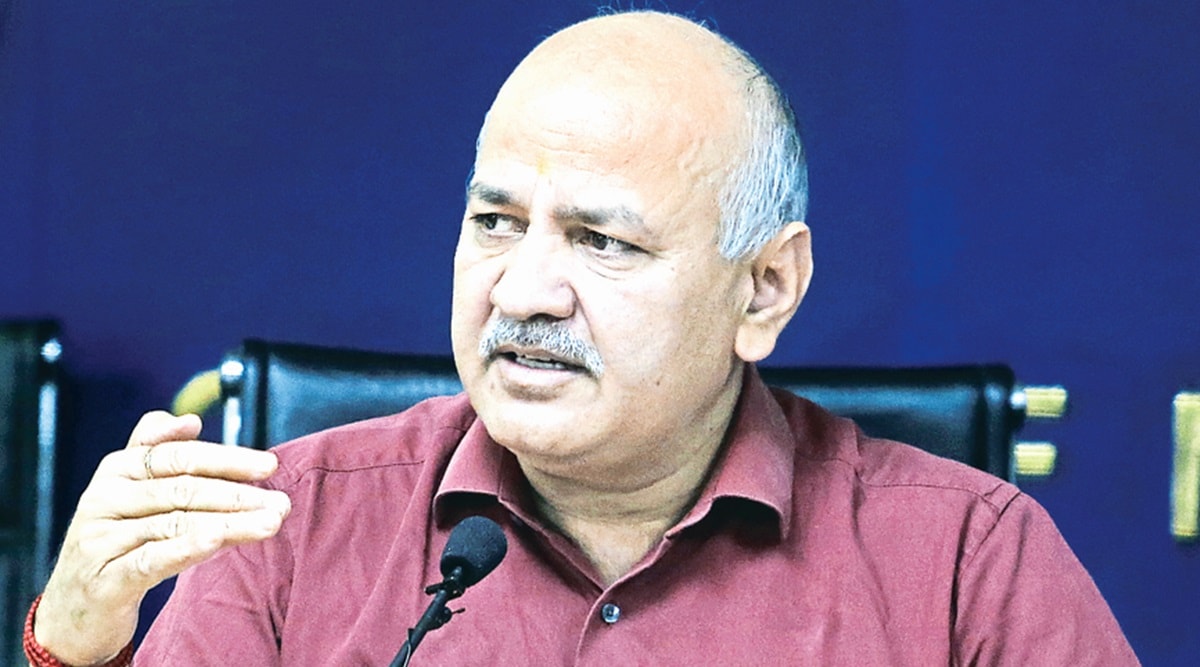 Sisodia announced the new excise policy for the capital, Monday. (Photo: Prem Nath Pandey)
Sisodia announced the new excise policy for the capital, Monday. (Photo: Prem Nath Pandey) The Delhi government will no longer run liquor vends in the city and will hand them over to private players through a process of bidding, Deputy Chief Minister Manish Sisodia said Monday.
Alleging high levels of corruption, Sisodia said tax evasion and brand pushing was common in these vends: “Out of the 849 liquor vends in the city, 60% are run by the government. Yet the 40% private vends give more revenue to the government than those run by the government.”
In a tweet, Chief Minister Arvind Kejriwal said the excise reforms will act as a “major blow” to the liquor mafia. “The mafia will do everything to obstruct these reforms. AAP government has ended mafia raj in many sectors like education, water, electricity, health etc. We are committed to reforming this sector too,” he said.
Sisodia said the “jail-like” shops, where people line up outside, will be a thing of the past: “Government-run shops are built on an area of 150 sq ft. You can see jail-like scenes outside them. The selling counter faces the street and there are long lines outside. Now, it will be mandatory for shops to be spread over an area of at least 500 sq ft. It will also be necessary that no counter opens towards the street. At present, there is a counter opening up on the street, and liquor is provided through a small window. This will stop. Counters will all be inside. Safety and security, law and order, cleanliness will be the responsibility of the shop owner.”
He also said, “No new vends have opened since 2016; no more will be opened either.”
The government had issued a draft liquor policy last year, following which over 14,000 suggestions and comments were received from the public. A group of ministers (GOM) was then formed to make recommendations based on the suggestions and the draft.
These suggestions were passed in Monday’s Cabinet meeting. According to officials, rules will now be made based on the recommendations and the policy will then be notified. It is after this that the new rules will be applicable, which could take up to three months, said senior officials.
Among the biggest moves to help increase excise revenue, a senior Delhi government official told The Indian Express, was the change in the way excise fee is collected. At present, it is collected as a percentage of the cost of each bottle sold. This is then submitted to the government. As per the GOM recommendations, the excise fee will be subsumed in licence fee.
“An estimated amount, based on the approximate bottles that are expected to be sold, will be charged at the time of giving licences. The biggest advantage of this is that there will be no incentive to not pay taxes, since business owners will have already paid a substantial amount upfront. A very small amount, 2% to 5%, will be levied at the time of actual sale. If the amount has already been paid in advance, why will anyone want to indulge in illegal practices,” the official said.
In a press conference, Sisodia also highlighted the unequal distribution of liquor vends and how it promotes illegal sale of alcohol.
“At present, the ward-wise map of Delhi shows that distribution of vends is grossly inequitable. There are vast areas where there is no vend and many areas that are over-served. Because of this, the liquor mafia gets a boost… Out of the 272 wards in Delhi, there are no vends in 79. In 14 wards, there are more than 11 vends. Overall, 58% of the wards are under-served and 20% are over-served. Almost 50% of the revenue comes from just 46 wards,” he said.
The new policy will also put in place provisions for quality checks of alcohol, which will be of international standards, the minister said.
As per the plan drawn up by the government, the city will be divided into 32 zones. Every zone will have roughly 9 wards. Bids will be invited for individual zones. Each zone will be further categorised into three categories in terms of high demand, moderate demand and low demand for liquor. There are plans to issue separate licenses for five “super-premium outlets”.